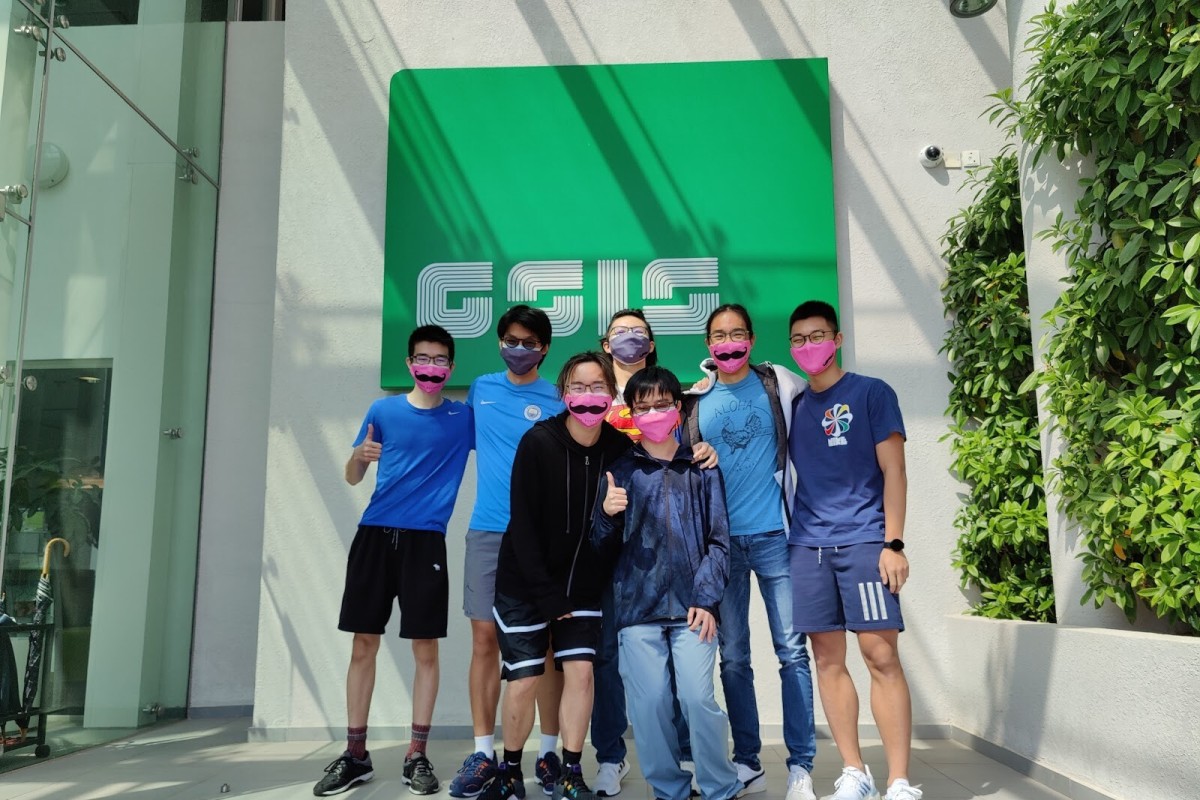
Hong Kong teens raise funds for Movember and men’s health with ‘Project Privates’
- They might not be able to grow moustaches themselves, but these GSIS students fully support the men’s health movement
- They want to remove the stigma of talking about testicular and prostate cancer
 From left to right: Nigel Ma, Jaden Cheng, Ken Liang, Ronny Chan, Justin Cheung, Julian Chow and Nathaniel Yeoh started ‘Project Privates’.
From left to right: Nigel Ma, Jaden Cheng, Ken Liang, Ronny Chan, Justin Cheung, Julian Chow and Nathaniel Yeoh started ‘Project Privates’.November isn’t just the month before Christmas. It is also known as “Movember”, a time when men grow moustaches to raise funds for testicular cancer research.
Last year, German Swiss International School students Ronny Chan, Julian Chow and Nathaniel Yeoh were inspired to get their peers talking about the issue. They found out that US Olympic gold medalist, Nathan Ghar-jun Adrian, whose mother is from Hong Kong, had to undergo surgery for testicular cancer when he was only 31. It was a surprise for them, as it made them realise that cancer can affect young men too, not just the elderly.
Hong Kong teens aim to tackle food waste with their invention, Easy Car
This prompted the Year 13 students to start Project Privates, a campaign for the Movember Foundation, which raises money for men’s health issues, particularly testicular and prostate cancer. So far they have raised about HK$10,000.
Young Post spoke to the trio earlier this month about their motivations and mission for the project. “[Nathan’s diagnosis] made us realise that everyone is susceptible to testicular cancer,” said Julian.
“Raising awareness and removing the stigma is important because these issues are often overlooked. If detected early, the disease has a higher rate of remission and may not have any lasting repercussions on the rest of the patient’s life.
At face value, the statistics look positive. The survival rate for testicular cancer is 95 per cent. For prostate cancer, it is 98 per cent. Unfortunately, there are some people that aren’t as lucky, and more needs to be done to support them through diagnosis and treatment.
The photo wall at German Swiss International School. (Photo: Nathaniel Yeoh)
“People are apprehensive to talk about testicular and prostate cancer, which is counterproductive because it causes reluctance to go to the doctor for a proper examination. Then they end up discovering the cancer when it’s too late,” said Ronny.
“There’s also an atmosphere of young men being afraid to talk about sensitive issues regarding their sexual organs,” said Julian.“Reducing the stigma will encourage people to go out and get help when they need it.”
Testicular cancer is simple to check for, and men can perform self-examinations after showering. “If you feel any lumps or abnormalities, go to the doctor immediately,” warned Julian.
Men cannot check for prostate cancer themselves, so they need to see a doctor for it. It tends to affect older men, so it’s something to think about more around 40 years old.
This amazing Hong Kong teen is breaking gender stereotypes about girls and STEM
It’s important for women to know about these issues too. “Obviously females are not at risk, but they may have important male figures in their life who are susceptible, so it’s important that everyone be educated,” said Nathaniel.
Project Privates did not start off so well. School closures and pandemic restrictions meant the group’s outreach methods were extremely limited, and they had to get creative.
“We adjusted by switching our presentations to videos so students could watch them at home, as well as selling customised face masks,” Nathaniel said.
Their most noteworthy event was a simple, but highly effective, photo wall. Students could donate money and take goofy pictures of themselves with cardboard cutouts of moustaches. This attracted a diverse crowd of students, teachers, and parents, and helped the group raise a majority of the funds they have donated so far.
Asking for a Friend: Help! How can I be successful when I failed my mock IB exams?
Project Privates hopes to expand its reach by working with organisations at other schools, such as ISF Academy and Kellett School, who have hosted similar events .
“By educating young people on testicular cancer, we can increase the number of men that get checked out and treated, thereby saving their lives. Even saving one life would be enough,” Julian said.
“The more people talk about this disease, the more the stigma goes away,” Nathan added.
What you need to know about testicular cancer
Testicular cancer is cancer that develops in the testicles, and is the most common type of cancer in young males aged 15-40. If detected early, the cure rate for testicular cancer is nearly 100 per cent. However, only half of all men with the disease are diagnosed early, and therefore suffer lasting consequences.
How to examine your testicles
1.Take a warm shower to relax the scrotum, making it easier to spot any lumps or bumps.
2.Roll your testicles one-by-one between your thumb and fingers and feel for any abnormal lumps or tender spots.
3.If there are any abnormalities, see your doctor immediately.